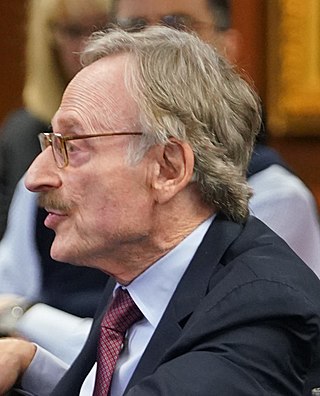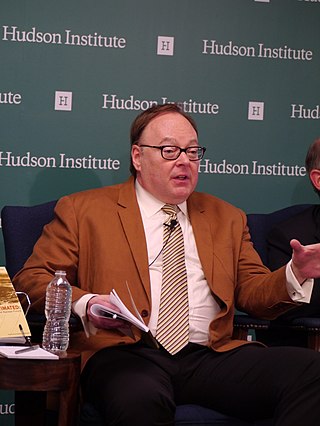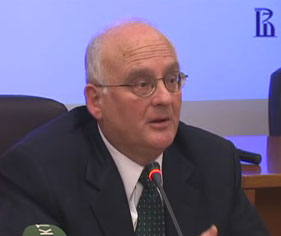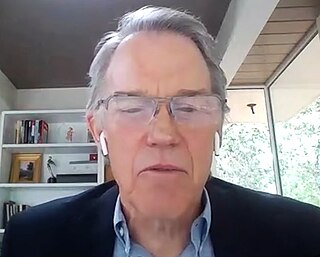Related Research Articles
A school voucher, also called an education voucher in a voucher system, is a certificate of government funding for students at schools chosen by themselves or their parents. Funding is usually for a particular year, term, or semester. In some countries, states, or local jurisdictions, the voucher can be used to cover or reimburse home schooling expenses. In some countries, vouchers only exist for tuition at private schools.
School choice is a term for education options that allow students and families to select alternatives to public schools. It is the subject of fierce debate in various state legislatures across the United States.

The Hoover Institution is an American public policy think tank which promotes personal and economic liberty, free enterprise, and limited government. While the institution is formally a unit of Stanford University, it maintains an independent board of overseers and relies on its own income and donations. It is widely described as conservative, although its directors have contested the idea that it is partisan.

Richard Allen Epstein is an American legal scholar known for his writings on torts, contracts, property rights, law and economics, classical liberalism, and libertarianism. He is the Laurence A. Tisch Professor of Law at New York University and the director of the Classical Liberal Institute. He also serves as the Peter and Kirsten Bedford Senior Fellow at the Hoover Institution and the James Parker Hall Distinguished Service Professor of Law emeritus and a senior lecturer at the University of Chicago.
Williamson M. "Bill" Evers is a former American libertarian activist and education researcher. In 1988, he became a resident scholar at Stanford University's Hoover Institution first as a national fellow, then as a visiting scholar, and most recently as a research fellow there and at The Independent Institute. He went on leave from Hoover to serve as Assistant Secretary for the Office of Planning, Evaluation and Policy Development in the United States Department of Education in 2007 to 2009. At the beginning of September 2016, he was selected to lead the "agency action team" for the Department of Education in the Trump-Pence transition.

Michael Jay Boskin is the T. M. Friedman Professor of Economics and senior fellow at Stanford University's Hoover Institution. He also is chief executive officer and president of Boskin & Co., an economic consulting company.
Caroline Minter Hoxby is an American economist whose research focuses on issues in education and public economics. She is currently the Scott and Donya Bommer Professor in Economics at Stanford University and program director of the Economics of Education Program for the National Bureau of Economic Research. Hoxby is a John and Lydia Pearce Mitchell University Fellow in Undergraduate Education. She is also a senior fellow at the Hoover Institution and the Stanford Institute for Economic Policy Research.
Chester Evans "Checker" Finn Jr. is a former professor of education, an educational policy analyst, and a former United States Assistant Secretary of Education. He is currently the president emeritus of the nonprofit Thomas B. Fordham Foundation in Washington, D.C. He is also a Fellow of the International Academy of Education, an Adjunct Fellow at the Hudson Institute, and a senior fellow at Stanford University's Hoover Institution where he chairs the Koret Task Force on K-12 Education. He was also a member of the Maryland Kirwan Commission on Education during its authorization period from 2016 to 2019.
Adam Gamoran is an American sociologist.

Eric Alan Hanushek is an economist who has written prolifically on public policy with a special emphasis on the economics of education. Since 2000, he has been a Paul and Jean Hanna Senior Fellow at the Hoover Institution, an American public policy think tank located at Stanford University in California. He was awarded the Yidan Prize for Education Research in 2021.
The Koret Task Force on K–12 Education is a group of senior education scholars brought together by the Hoover Institution, Stanford University, who work collectively as well as individually on American public education reform issues. The task force was created in 1999 as part of the Hoover Institution's Initiative on American Educational Institutions and Academic Performance. The group conducts original research and assessments of a broad variety of K–12 education issues, policies, and practices.

Tod Lindberg is an American political expert and a current Senior Fellow at the Hudson Institute, having previously been at Stanford University's Hoover Institution. His research focuses on political theory, international relations, national security policy, and American politics. He was also the editor of Policy Review, the Hoover Institution's bimonthly journal. He is a member of the Council on Foreign Relations.

Kevin G. Welner is professor of education at the University of Colorado Boulder School of Education, where he chairs the Educational Foundations Policy and Practice program area. He co-founded and is Director of the National Education Policy Center. He has authored or edited 11 books and more than 100 articles and book chapters concerning education policy and law.

Philip G. Altbach is an American author, researcher and former professor at Boston College, and the founding director of the Boston College Center for International Higher Education.

Terry M. Moe is a professor of political science at Stanford University, a senior fellow at Stanford University's Hoover Institution, and a member of the Hoover Institution’s Koret Task Force on K-12 Education. Moe is a political scientist, an education scholar, and a bestselling author. He has a B.A. in Economics from the University of California, San Diego, and a Ph.D. in Political Science from the University of Minnesota. At Stanford, he holds an endowed professorship of political science called the William Bennett Munro professorship.
William G. Howell is an American political scientist and author. He is the Sydney Stein Professor in American Politics at Chicago Harris and a professor in the Department of Political Science and the College at the University of Chicago. He has written widely on separation-of-powers issues and American political institutions, especially the presidency.
Martin Carnoy is an American labour economist and Vida Jacks Professor of Education at the Stanford Graduate School of Education. He is an elected member of the National Academy of Education as well as of the International Academy of Education. Professor Carnoy has graduated nearly 100 PhD students, a record at Stanford University.
Brian Aaron Jacob is an American economist and a professor of public policy, economics and education at the Gerald R. Ford School of Public Policy of the University of Michigan. There, he also currently serves as co-director of the Education Policy Initiative and of the Youth Policy Lab. In 2008, Jacob's research on education policy was awarded the David N. Kershaw Award, which is given by the Association for Public Policy Analysis and Management and honours persons who have made a distinguished contribution to the field of public policy analysis and management before the age of 40. His doctoral advisor at the University of Chicago was Freakonomics author Steven Levitt.
Helen F. Ladd is an education economist who currently works as the Susan B. King Professor Emeritus of Public Policy and Economics at Duke University's Sanford School of Public Policy. In recognition of her research on the economics of education, she has been elected to the National Academy for Education and the National Academy of Sciences.
Christopher Lubienski is a professor of education policy at Indiana University, Bloomington, where he is also Director of the Center for Evaluation and Education Policy. He is also a fellow at the National Education Policy Center, Guest Professor and Senior Research Fellow at the Center for Global Studies of Educational Leadership and Collaboration at East China Normal University in Shanghai, and Adjunct Professor at Murdoch University in Western Australia, where he also served as Sir Walter Murdoch Visiting Professor.
References
- ↑ Education Sector: Analysis and Perspectives: Market Forces: Professor Paul Peterson's Influential Protégés Archived 2007-08-14 at the Wayback Machine
- ↑ http://educationnext.org/sub/about/ Hoover Institution – About Education Next Archived 2007-08-26 at the Wayback Machine
- ↑ "Paul Peterson". Archived from the original on 2007-09-06. Retrieved 2007-08-13.
- ↑ PEPG People: Paul E. Peterson
- ↑ Hoover Institution - Fellows - Paul E. Peterson
- ↑ June 1998
- ↑ Research Center: Influence: A Study of the Factors Shaping Education Policy
This article needs additional or more specific categories .(January 2024) |